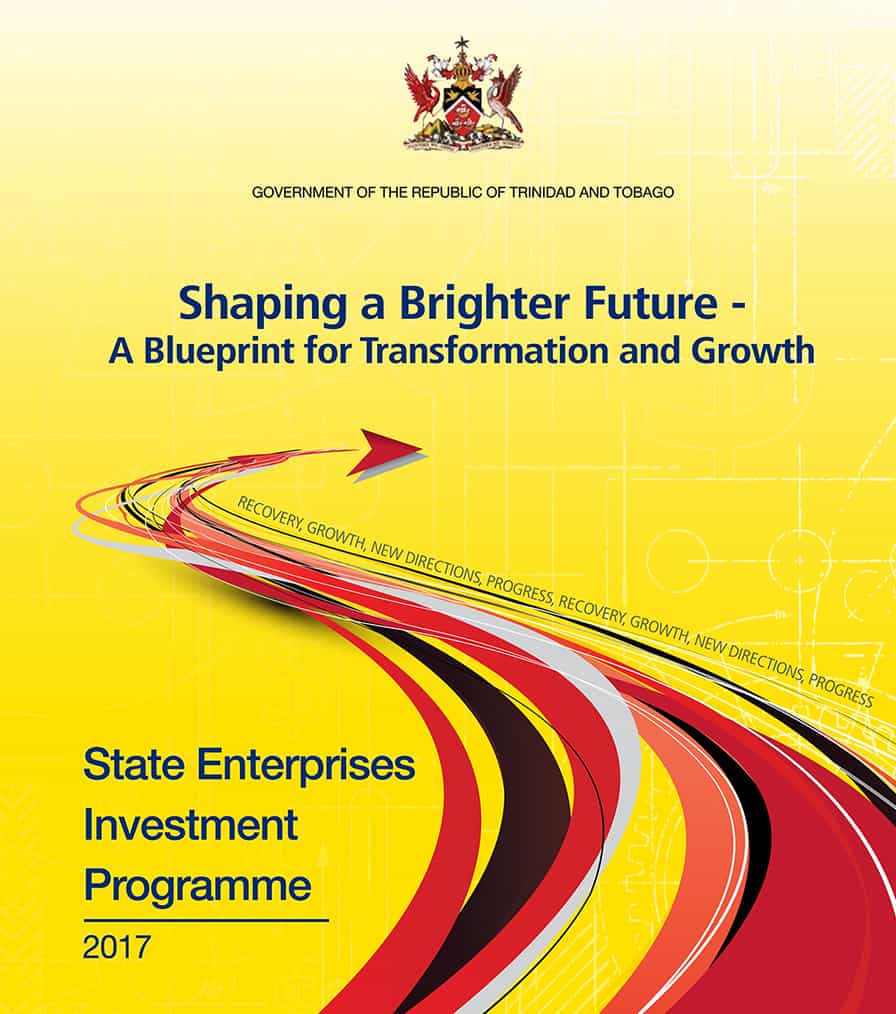
Above: The State Enterprises Investment Programme document for 2017 is the “blueprint” that public sector spending and prioritisation will follow. Technology initiatives are almost invisible in its pages.
BitDepth#1061 for October 04, 2016
In his second budget presentation, Minister of Finance Colm Imbert played again to the cheap seats, offering minimal fiscal dings and tentative benevolence to citizens living on the monetary margins of society.
There’s a lot in the budget that seeks to soften the impact of significantly reduced petroleum income on the poor and lower middle-class in T&T, but it’s hard to see how anything in the budget for 2016/2017 is going to seed the inventive startups needed for diversification.
As one might expect from this column, I hold a strong brief in support of technology’s role in accelerating initiatives that will diversify and amplify income outside of oil and gas.
The focus in the main budget statement under the heading ICT sought to yoke an ambition to build “a knowledge-based and well-connected society as a foundation for increasing productivity” to the rather tentative presence of free WiFi on 13 PTSC buses.
“And this is just the beginning,” Minister Imbert promised, before putting a rather contrarian full stop to the entire paragraph headed “Information Communication and Technology” in the budget.
Beyond that, the Finance Minister switched rather decisively from giveth to taketh away.
The laptops being purchased for schools under the PNM administration will, he said, “remain the property of the Ministry of Education.”
Except that the laptops issued over the four years of the PP administration are also the Education Ministry’s property as specified under the contract governing their use.
What Mr Imbert probably meant is that the computers would be more decisively remain under the control of the Ministry, since they would not be allowed to leave any school’s compound.
The Minister is correct to note that the previous programme was implemented with more emphasis on showy distributions than on serious linkages between classroom, digital device and teacher, but I can’t help but feel that reducing access to a computer from 24 hours to what’s likely to turn out to be less than five is a fundamentally bad idea.
The Bring Your Own Device policy for CSEC and CAPE students also holds the dark promise of amplifying the divide between haves and have-nots if it isn’t managed carefully.
Perhaps the promised ICT Steering Committee, ICT in Education Policy, curriculum reform and teacher training will make a critical difference in this refreshed implementation of the laptops in schools initiative.
The seven per cent online purchase tax begins on October 20 on the basis that people who shop online “have more disposable income.”
That’s going to sting SMEs who source items using those channels and technology purchasers specifically, who generally demand a much wider range of product options in smaller quantities than local suppliers can reliably or profitably stock.
These are measures pitched at the proverbial Joe Public, but there’s precious little for Joe Geek.
The budget statement tends to be a top-level job of showmanship, particularly in an economy that’s hurting, highlighting the big bite items and the efforts at government generosity.
The real information about the fiscal plan for the PNM’s second year in the economic driver’s seat is to be found in the supplemental documents, specifically the State Enterprises Investment Programme plan for 2017
The only visible outline for technology development hinges on the mortally wounded eTeck Tamana Intech Park at Wallerfield.
The project occupies 1,100 acres of land, but hasn’t declared its flagship building complete, despite spending on the project to the tune of $1 billion as of 2012.
The government is now planning preventive maintenance and ongoing repairs to the building at Tamana, which currently houses eTeck’s head office at a cost of $4.8 million with not a word about the technology park.
The company, created as the cutting edge of technology development in T&T, is now a more diffuse agency involved in hotel management, “sector development” and investment promotion with a “new energetic, visionary role in the development of modern economic zones.”
In pursuit of that admirably unclear business proposition, $2.8 million has been set aside for a customer relationship management solution and the procurement of computer hardware in 2017.
Those economic zones will have to be sited carefully, because the government also intends to sell off half of the industrial estates currently being managed by eTeck in order to raise $500 million in the coming year.
You will, in short, find nothing imaginative, forward-looking or even particularly interesting regarding technology in either the formal budget statement or the more detailed State Enterprises Investment Programme document for 2017.
And that’s far more troubling than a budget that’s based on a six billion dollar deficit.


